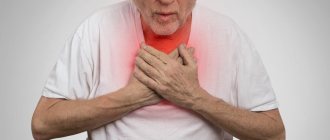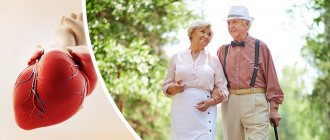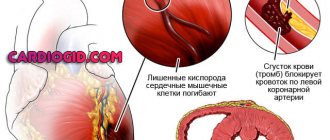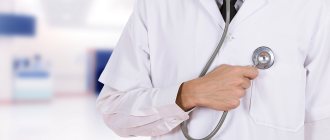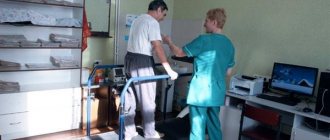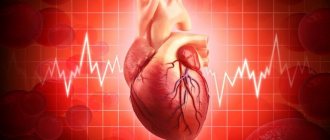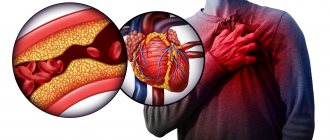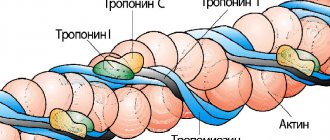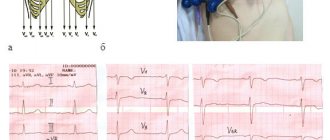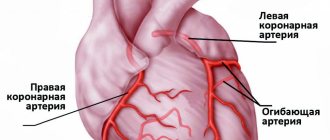Why does angina develop?
The main reason for the appearance of this paroxysmal pain behind the sternum is a violation of the blood supply to the heart muscle or ischemia. With increasing loads, the heart needs increased blood flow, but the required volume of blood flow cannot pass through the narrowed coronary arteries in time, which provokes myocardial ischemia (oxygen starvation) of the heart muscle. Ischemia causes rapid accumulation of metabolic products in the form of lactic and other acids, which is manifested by a characteristic pain syndrome.
Myocardial infarction: symptoms and first aid
In the previous article, we talked about what myocardial infarction is and what are the reasons for its occurrence. I also mentioned that timely help can reduce the consequences of an attack to a minimum. And in continuation of the topic, we will dwell in more detail on the main symptoms of myocardial infarction and what should be done first if a misfortune does happen.
How to recognize myocardial infarction
But first, how do you know when it’s time to sound the alarm? It is important not so much to “not confuse” a heart attack with something else, but to realize in time that this could be exactly it. And the main symptom here is pain. It can be different - strong, burning, pressing, cutting, sometimes dull, sometimes (most often in diabetics) very weak. Usually behind the sternum, not in the area of the left nipple, but precisely behind the sternum, radiating to the left arm, neck, jaw.
Already at the prehospital stage, a serious problem can be suspected based on the location and intensity of pain. But sometimes such pain can be masked behind problems in the spine, exacerbations in the stomach. Therefore, it happens that a doctor, instead of recommending that the patient undergo a clinical minimum, which includes electrocardiography, treats pancreatitis. And only then at the autopsy they find an acute extensive myocardial infarction.
Another feature: if angina pain goes away after taking a nitroglycerin tablet under the tongue, then if the myocardium is damaged, it does not stop so easily. And if the pain continues for more than fifteen minutes, you need to urgently call an ambulance!!! Remember the “golden” first hour!
How to save
Before the ambulance arrives, you need to do the following:
1. Lay the victim down, raise the head end of the bed.
2. Give a nitroglycerin tablet under the tongue.
3. Give an aspirin tablet with milk. The victim must chew it first (or try crushing the tablet in advance).
4. In addition, sedative drops will not be superfluous for the patient...
5. ...and, possibly, an anesthetic (analgin, baralgin).
6. After this, call an ambulance as soon as possible!!! Be sure to report the assistance you have already provided.
Harmful advice from a resuscitator
Help is, of course, important and necessary, but you must remember that your lifestyle plays a major role in the development of ischemic damage to the heart muscle. How should you treat your health so as not to end up in a hospital bed and play the game? On this topic, I have prepared for you some special tips that will probably work, only... on the contrary.
Tip 1.
Eat more fatty foods, more hamburgers, only mayonnaise, butter, zhyyyrr!!! And less movement! We need to make sure that the body produces as much low-density cholesterol as possible and does not have time to process it!
Tip 2. Smoke, smoke a lot, two packs a day! So that every cigarette you smoke makes you dizzy, due to the narrowing of all blood vessels in the body. The coronaries also spasm from pleasure. Smoking is nothing better for the heart!
Tip 3.
A glass of red wine only makes your vessels cleaner due to the presence of antioxidants in it - don’t drink it! Drink surrogates, a lot of alcohol surrogates, and then the myocardium will thank you.
Tip 4.
Accumulate negative psychological energy within yourself. Don’t throw it out in sports, save it up, “digest” endlessly difficult thoughts. Constant chronic stress leads to an increase in adrenaline levels and perfectly constricts the coronary vessels!
Tip 5. The pressure is a little off the charts, but you don’t feel it? And to hell with it, live as long as fate has determined, just think - a vessel in the brain will burst, but this is a wonderful sudden death without suffering! Continue, gentlemen of hypertension, in the same spirit!
Tip 6.
Harmful relatives dragged you to the doctor, and he prescribed aspirin? And the doctor also mumbles that the blood needs to be thinned, and meanly hints at your forty-five-year-old age? Don't listen to him, you're still young! Listen to your neighbor, who has an ulcer because he treated the flu with this same aspirin, and it doesn’t matter that the dose of aspirin is tiny. Moreover, in the morning, blood periodically flows from your nose - this is definitely not pressure, this is liquid blood!
And the fact that in some Americas everyone swallows aspirin, let them swallow it, soon all of America will be plunged into darkness due to the explosion of a volcano in the Yellowstone Nature Reserve.
Tip 7. Electrocardiogram? Tests, some kind of cholesterol, high and low density?.. But who needs it! Stand in lines, but what good, and they ask for money, charlatans. And when you don’t know about the disease, you sleep better.
Tip 8.
Everyone recommends eating sea fish, like it contains some kind of polyunsaturated fatty acids. What for? Why do you need this zhyyyyr? You can’t understand these doctors: either eat fat or don’t eat fat... So don’t touch this stinking fish! The best fish is pork in general. Eat it with lard every day!
I hope that after these “tips” you correctly understand what kind of lifestyle you need to lead in order not to meet my colleagues!
Be healthy!
Vladimir Shpinev
Photo thinkstockphotos.com
Products by topic: [product](nitroglycerin), [product](aspirin), [product](analgin), [product](baralgin), [product](tonometer)
How does angina pectoris manifest?
Painful attacks usually develop:
- during physical activity;
- at the peak of strong emotional arousal;
- after a heavy meal;
- when staying in the cold, especially in the wind, which contributes to spasm of the coronary arteries.
- with increased blood pressure.
All such situations require an increased amount of oxygen to be supplied to the heart muscle, i.e. increasing blood flow.
Symptoms of angina include:
- pain or discomfort of a squeezing, pressing nature behind the sternum;
- describing the sensations, the patient puts a clenched fist to the center of the chest;
- spread of pain to the left half of the body, left shoulder, arm, under the shoulder blade or in the lower jaw;
- less often – pain spreads to the right arm or shoulder, throughout the entire jaw, in the interscapular area
The attack itself lasts from 1 to 15 minutes. Longer persistence of pain is classified as a pre-infarction state or myocardial infarction itself. In addition, chest pain should disappear after stopping physical activity and/or taking nitroglycerin. If an attack of pain is typical for angina pectoris, but nitroglycerin does not help, then suspicions of developing myocardial infarction also arise.
Heart Enemy N1
More than half of deaths in Russia are caused by cardiovascular diseases.
This figure is more than three times higher than in developed countries. In addition, the number of patients who returned to a full life after a heart attack, unfortunately, is much less in our country than in these countries. And all because in our country little attention is paid to the prevention of heart diseases and their timely diagnosis. Therefore, when a person finally turns to doctors, they are sometimes already powerless.
And another reason is that people in our country do not know the enemy “by sight.” Meanwhile, even minimal knowledge in this area is an additional chance for a long life.
What is a heart attack
Myocardial infarction is an acute condition caused by the death of an area of heart muscle tissue. What threatens a person in this case:
- cardiac arrest or rupture;
- ventricular fibrillation (that is, their erratic contraction, which always leads to cessation of blood flow even in large arteries);
- acute heart failure or other conditions that really threaten the patient’s life.
Why does this happen
The main cause of the disease is atherosclerosis. If the blood contains certain fats (cholesterol and other lipids) in excess, they are deposited in the wall of large arteries in the form of so-called atherosclerotic plaques. At the most unexpected moment, the plaque, and therefore the inner lining of the artery of the heart, can crack and tear. Blood clots form at this site, closing the lumen of the artery. The blood flow stops, the death of heart cells begins and myocardial infarction develops.
The larger the artery through which blood flow to the heart is stopped, the more myocardial cells will die, and the larger the infarction.
The integrity of the atherosclerotic plaque can be disrupted by rapid heartbeat and increased blood pressure due to stress, severe physical or emotional stress. But often a heart attack develops for no apparent reason, often even in a dream. His “favorite” time is early morning.
Risk factors
- being male (men over 40 and even younger are the most vulnerable group);
- postmenopausal age in women;
- heredity - the presence of relatives in the family who have had early heart attacks;
- elevated blood cholesterol (more than 5 mmol/l or more than 200 mg/dl);
- smoking (one of the most significant risk factors!);
- excess body weight, poor diet and sedentary lifestyle;
- excessive emotional stress;
- increased blood pressure (more than 140/90 mm Hg at any age);
- diabetes.
Even one of these factors creates a real threat of “acquaintance” with myocardial infarction. And if there are more of them, visits to the cardiologist should become regular. And in your home medicine cabinet the presence of nitroglycerin and valocordin is a must.
Harbingers
Everyone is well aware of the term - pre-infarction state. In addition to the appearance of heart pain, a person may experience a feeling of anxiety and depression during this period. But sometimes a heart attack develops immediately from the acute period, without warning signs.
Attention! At the slightest suspicion of a heart attack, immediately call an ambulance - the time factor is crucial here. This is a chance to stay alive. The symptoms of the disease are:
- The main sign of a heart attack is severe pain in the middle of the chest. Feelings of squeezing of the heart, burning.
- The pain can radiate to the jaw, neck, arm, shoulder, back. Similar pain occurs with angina pectoris, but during exercise, and with a heart attack it is more severe and often begins at rest, and does not go away even after taking medications.
- Severe weakness, anxiety, lack of air. Shortness of breath appears, and jumps in blood pressure are noted. The person turns pale and breaks out in a cold sweat.
- Sometimes pain occurs far from the heart. When the pain spreads to the abdominal area or thigh, vomiting or hiccups may occur. In such cases, a heart attack is often confused with food poisoning or diseases of the abdominal organs.
- Sometimes a heart attack is accompanied by an unreasonable increase in temperature to 38.5 degrees. Together with shortness of breath and chest pain, it somewhat resembles an acute cold. Dizziness appears, and the patient may lose consciousness.
If the patient has at least one of these symptoms, without a doubt call an ambulance. Let the doctor do an ECG on site and clarify the diagnosis. After all, with a heart attack, unbearable pain does not necessarily occur.
Prevention
- It was once fashionable to “run from a heart attack,” but now experts consider walking in the fresh air preferable—at least 5-6 kilometers a day.
- Maintain normal blood pressure.
- Normalize your blood sugar levels.
- Stop smoking! This is one of the reliable ways to prevent heart attack.
- Try to lose excess weight. The diet should be low in animal fats and cholesterol. More vegetables and fruits. Instead of pork, replace white poultry meat, replace butter with vegetable oil, preferably olive oil, and lard with fish.
Before the doctor arrives
During the summer season, the number of so-called garden heart attacks increases. Doctors advise: the country first aid kit must contain medications to lower blood pressure, nitroglycerin and a tonometer. It is important to be able to provide first aid to a patient before a specialist arrives.
- If the pain does not go away within 4-5 minutes, place a nitroglycerin tablet under your tongue and wait until it is completely dissolved. Remember that nitroglycerin can dramatically lower blood pressure.
- If the first tablet does not help, you can take another one. But do not take more than five tablets within an hour. You can chew half a tablet of regular aspirin.
And do not hesitate to call an ambulance.
adviсe
Last resort
In case of clinical death (lack of consciousness, breathing and heartbeat, wide pupil), without wasting time and without waiting for a doctor, try to bring the person back to life: ventilate the lungs using mouth-to-mouth artificial respiration, perform chest compressions. Yes, although it is scary to put pressure on a person’s chest during a heart attack, doctors admit that there is simply no other way of resuscitation.
This is how the procedure is described:
- Place the patient on a hard surface.
- Kneel to the side of the victim - at chest level.
- Unfasten his belt and all constricting parts of his clothing.
- Place the heel of your right palm (unless you're left-handed) on the lower third of your sternum. Place the base of the second palm on top, straighten the fingers of both hands so that they form an oblique cross. Leaning on your chest with straight arms, make sharp pressing movements on the chest at a speed of up to 100 times per minute.
- Direct the force strictly vertically. Don't bend your arms.
- The depth of pressure on the sternum is at least 5 centimeters.
Diagnosis of angina pectoris
The main role in identifying the type of angina, its functional class and the degree of myocardial ischemia belongs to such functional instrumental techniques as:
- ECG at rest and during an attack;
- ECG during physical activity - stress test;
- echocardiography, c. incl. with load – stress echocardiography;
- daily ECG monitoring (to a lesser extent);
- myocardial scintigraphy against the background of physical or pharmacological stress;
If functional methods reveal signs of high grade myocardial ischemia, then examination of the coronary vessels is necessary.
Coronary angiography or MSCT angiography (computer coronary angiography) is used directly to diagnose damage to the coronary (heart) vessels.
Prevention of complications and treatment of myocardial infarction
You can make an appointment for a fee with a cardiologist in Yekaterinburg by calling: +7 (343) 228-11-28 or through the clinic’s website.
Cardiologists at the Family Clinic use the latest scientific advances in the diagnosis and treatment of cardiovascular pathologies. Doctors constantly attend seminars and conferences devoted to the problems of treating myocardial infarction. We work with all age groups. To make an appointment, call the contact number or send an email.
